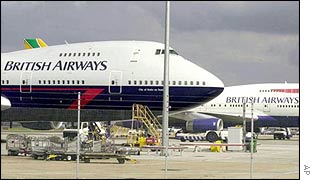| You are in: Science/Nature | ||||||||||||||||||||||||||||||||||||||||||||||||||||||||||||||||||||||||||||||||||||||||||||||||||||||||||||||||||||||||||||||||||||||||||||||||||||||||||||||||||||||||||||||||||||||||
|
Monday, 29 July, 2002, 03:23 GMT 04:23 UK
Boeing tries to defy gravity

An anti-gravity device would revolutionise air travel
Researchers at the world's largest aircraft maker, Boeing, are using the work of a controversial Russian scientist to try to create a device that will defy gravity.
The company is examining an experiment by Yevgeny Podkletnov, who claims to have developed a device which can shield objects from the Earth's pull.
Dr Podkletnov is viewed with suspicion by many conventional scientists. They have not been able to reproduce his results. The project is being run by the top-secret Phantom Works in Seattle, the part of the company which handles Boeing's most sensitive programmes. The head of the Phantom Works, George Muellner, told the security analysis journal Jane's Defence Weekly that the science appeared to be valid and plausible. Dr Podkletnov claims to have countered the effects of gravity in an experiment at the Tampere University of Technology in Finland in 1992. The scientist says he found that objects above a superconducting ceramic disc rotating over powerful electromagnets lost weight. The reduction in gravity was small, about 2%, but the implications - for example, in terms of cutting the energy needed for a plane to fly - were immense. Scientists who investigated Dr Podkletnov's work, however, said the experiment was fundamentally flawed and that negating gravity was impossible. Research explored But documents obtained by Jane's Defence Weekly and seen by the BBC show that Boeing is taking Dr Podkletnov's research seriously. The hypothesis is being tested in a programme codenamed Project Grasp. Boeing is the latest in a series of high-profile institutions trying to replicate Dr Podkletnov's experiment. The military wing of the UK hi-tech group BAE Systems is working on an anti-gravity programme, dubbed Project Greenglow. The US space agency, Nasa, is also attempting to reproduce Dr Podkletnov's findings, but a preliminary report indicates the effect does not exist.
|
See also:
29 Jul 02 | Science/Nature
27 Mar 00 | Science/Nature
29 Jul 02 | Media reports
Internet links:
The BBC is not responsible for the content of external internet sites Top Science/Nature stories now:
Links to more Science/Nature stories are at the foot of the page.
|
||||||||||||||||||||||||||||||||||||||||||||||||||||||||||||||||||||||||||||||||||||||||||||||||||||||||||||||||||||||||||||||||||||||||||||||||||||||||||||||||||||||||||||||||||||||
|
Links to more Science/Nature stories |
 |
||
| ----------------------------------------------------------------------------------
To BBC Sport>> | To BBC Weather>> | To BBC World Service>> ---------------------------------------------------------------------------------- © MMIII | News Sources | Privacy |